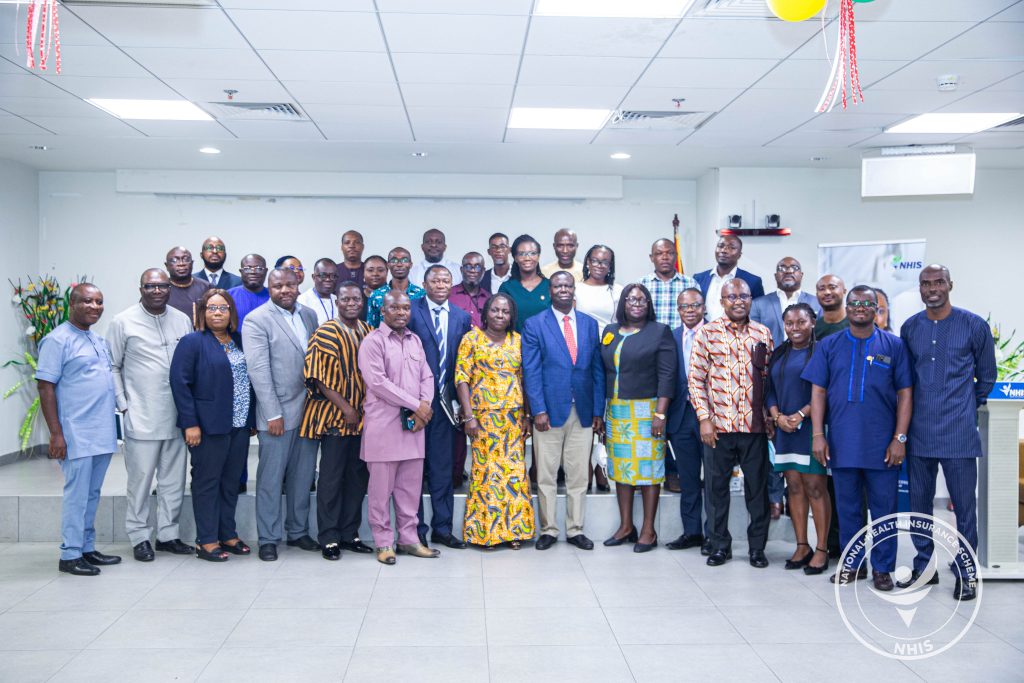By Daniel Adu Darko
Accra, Oct. 19, GNA – The National Health Insurance Authority (NHIA) has met stakeholders, including accredited health service providers under the National Health Insurance Scheme (NHIS) over the growing trend of out-of-pocket payments demanded from members of the scheme.
The unapproved charges, otherwise known as co-payment, according to National Health Insurance Authority (NHIA) were an outright violation of the law (Act 852) and the contractual agreement between the National Health Insurance Authority (NHIA) and the accredited healthcare service providers.
Addressing the media at the Ministry of Health Conference room, Dr. Bernard Okoe Boye, Chief Executive Officer of the National Health Insurance Authority said the practice was seriously threatening to erode the gains made by the scheme, hence, the need for an immediate action to stem the tide.
He bemoaned how co-payment had assumed disturbing heights in healthcare facilities across the country, where it was becoming a norm rather than the exception.
Dr. Okoe Boye said the menace of co-payment was not only undermining the efforts of the healthcare providers and purchasers, but also the government’s efforts to achieve universal health coverage as established by an act of Parliament in 2003.

“…we owe it as a duty to ourselves, our people, and posterity to ensure the success of the Scheme, a goal we have all fortunately committed to as stakeholders. The Scheme in its 19 years’ journey has undergone several policy and operational reforms through stakeholder engagements and consensus building to improve efficiency, enhance quality of healthcare, and to ensure sustainability.
“There have been significant improvements in utilization and access to healthcare, with over 90 per cent of OPD attendance in public institutions and 70 per cent in credentialed private health institutions being members of the scheme”, Dr Okoe Boye mentioned.
He again noted that some operational reforms of the Scheme had made it possible for claims submitted for services rendered to be in excess of GHS120 million monthly. The scheme is becoming the major contributor to the internally generated funds of most public health facilities and a boost to expansions in health infrastructure.
He said, however, it was disturbing to receive daily complaints from the members of the scheme that healthcare providers had unilaterally resorted to demanding out-of-pocket payments and extra charges for services and medicines covered by the scheme.
He observed that the phenomenon was making the National Health Insurance Scheme unpopular.
“The Authority receives several cases of co-payments on daily basis through the call centre and from the districts, and regions across the country. Every 6 out of 10 calls received at our call centre is related to co-payments, including the very unpleasant cases of NHIS members detained by some providers over extra payment demands”, he disclosed.
He also disclosed that a survey on co-payments conducted by the research directorate of the Authority revealed that the menace was pervasive across the regions and healthcare provider types with no exceptions.
“At the tertiary and secondary care levels, NHIS members are made to pay for most services, including all laboratory investigations, and about 80 per cent of medications prescribed. Whereas at the primary care level, apart from blood film for malaria, all other laboratory investigations and about 50 per cent of medications prescribed are paid for by members in addition to other services”, he revealed.
He however expressed worry that the practice by the healthcare providers defeated the mandate of the Authority and the Scheme, thereby impacting negatively its operations and making it unattractive to the public.
Dr. Okoe Boye further said that the stakeholders’ engagement was a step by the Authority to engage and allow for a dispassionate deliberation on the issue and proffer long-lasting binding solutions to the menace for the betterment of the scheme towards the attainment of the universal health coverage as envisioned by the government and the people of Ghana.
GNA